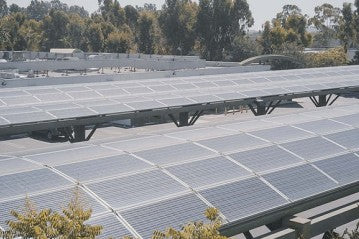
What's the Difference Between a Deep Cycle Battery and a Regular Battery?
When it comes to harnessing solar energy, having a reliable and efficient energy storage system is crucial. One of the key components of such a system is the battery. However, not all batteries are created equal. In the world of solar energy, two popular options are traditional lead-acid batteries and deep cycle batteries. In this blog post, we will explore the differences between these two battery types, their operation, and the pros and cons of each. By understanding their distinctions, you'll be better equipped to make an informed decision when choosing the right battery for your solar energy system.
1. What Is a Traditional Lead-Acid Battery?
A traditional lead-acid battery is the most common type of battery and has been used for decades in various applications. It consists of lead plates immersed in an electrolyte solution of sulfuric acid.
2. How Does a Lead-Acid Battery Work?
In a lead-acid battery, a chemical reaction occurs between the lead plates and the sulfuric acid, producing electrical energy. This energy is released in the form of direct current (DC) when the battery is discharged.
Pros of Lead-Acid Batteries
- Affordable: Lead-acid batteries are relatively inexpensive compared to other battery technologies.
- High surge current: They can deliver a high amount of current in a short period, making them suitable for applications that require quick bursts of power.
Cons of Lead-Acid Batteries
- Limited depth of discharge (DoD): Lead-acid batteries should not be discharged below a certain percentage of their capacity to prevent damage and shorten their lifespan.
- Maintenance required: Regular maintenance, including checking electrolyte levels and topping up with distilled water, is necessary to ensure optimal performance and longevity.
- Lower energy density: Lead-acid batteries have a lower energy density, meaning they can store less energy per unit of weight compared to other battery types.
3. What Is a Deep Cycle Battery?
A deep cycle battery is specifically designed to provide a consistent and steady amount of power over a long duration. It is commonly used in renewable energy systems, such as solar power installations, where frequent and deep discharging is required.
4. How Does a Deep Cycle Battery Work?
Deep cycle batteries are built with thicker and more robust plates compared to lead-acid batteries. This design allows them to withstand repeated charging and discharging cycles without experiencing significant damage or loss of capacity.
Pros of Deep Cycle Batteries
- Deep discharge capability: Deep cycle batteries can be discharged to a much lower percentage of their capacity without causing harm, making them ideal for long-duration energy storage.
- Longer lifespan: The sturdy construction of deep cycle batteries enables them to handle numerous charge and discharge cycles, resulting in a longer overall lifespan.
- Higher energy density: Deep cycle batteries typically have a higher energy density than lead-acid batteries, meaning they can store more energy per unit of weight.
- Low self-discharge rate: Deep cycle batteries have a lower self-discharge rate, allowing them to hold their charge for longer periods, which is particularly beneficial for intermittent usage.
Cons of Deep Cycle Batteries
- Higher cost: Deep cycle batteries generally have a higher upfront cost compared to traditional lead-acid batteries. However, their longer lifespan and superior performance may justify the investment.
- Reduced surge current: Deep cycle batteries are not as effective at delivering quick bursts of power compared to lead-acid batteries, making them less suitable for applications that require high surge currents.
5. How to Choose the Right Battery for Your Solar System?

When considering which battery to choose for your solar energy system, it's important to assess your specific needs and priorities. If you require a battery that can handle occasional high-power demands and cost-effectiveness is a primary concern, a traditional lead-acid battery may be a suitable choice. However, if you need a battery that can provide sustained power over longer durations, tolerate deeper discharges, and offer a longer overall lifespan, a deep cycle battery is likely the better option despite its higher upfront cost.
Ultimately, the decision between a deep cycle battery and a regular lead-acid battery depends on the specific requirements of your solar energy system. It is recommended to consult with experts in the field, such as solar energy installers or battery suppliers, who can provide tailored advice based on your needs and budget.
6. Conclusion
Investing in a reliable and efficient battery is crucial for maximizing the benefits of your solar energy system. By understanding the differences between deep cycle batteries and traditional lead-acid batteries, you can make an informed decision that aligns with your energy storage goals.
With the right battery choice, you can enhance the efficiency and sustainability of your solar energy setup, ensuring a consistent and reliable power supply even during periods of low or no sunlight. ECGSOLAX offers high quality solar deep cycle batteries in different specifications and models. If you are interested in our products, please contact us and learn more!

0 comments